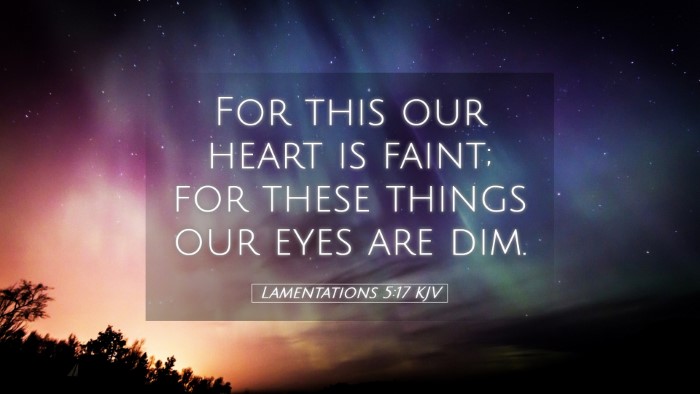Lamentations 5:17 Commentary
Introduction
Lamentations 5:17 states, "For this our heart is faint; for these things our eyes are dim." This verse encapsulates the profound sorrow and desolation faced by the people of Israel after the destruction of Jerusalem. The emotional depth and theological implications of this verse warrant a detailed exploration aimed at providing pastors, students, and theologians with rich insights.
Contextual Background
The Book of Lamentations is traditionally attributed to the prophet Jeremiah and reflects the grief over the fall of Jerusalem in 586 B.C. This particular chapter summarizes the collective anguish of the people, moving from personal lament to communal suffering. The stark realities of exile and loss are captured poignantly throughout the text, illustrating both human emotion and divine justice.
Verse Analysis
In Lamentations 5:17, the heart symbolizes the emotional and spiritual state of Israel, while the eyes reflect the perception of hope and vision for the future. To understand this verse fully, we must explore the implications of a "faint" heart and "dim" eyes as described in the public domain commentaries.
1. The Faint Heart
Matthew Henry notes that the "faintness" of the heart indicates a complete loss of strength and vitality. The people of Israel were overwhelmed by their circumstances, leading to despair. Such faintness is not merely physical; it represents an emotional and spiritual state where hope seemed extinguished and faith waned.
2. Dim Eyes
Albert Barnes elaborates on the metaphor of "dim eyes." The imagery suggests a lack of clarity and vision, as if the people could no longer see the light of God’s promises. Their suffering caused them to lose sight of God's faithfulness and mercy, leading to a profound sense of helplessness. The world around them seemed dark and devoid of hope.
Theological Insights
The lament expressed in this verse unveils rich theological truths about suffering, human frailty, and the nature of God. Adam Clarke emphasizes that while lamentation is a sign of despair, it also serves as a gateway to divine restoration. The acknowledgment of their condition is the first step toward seeking God’s mercy.
1. The Nature of Suffering
The book of Lamentations serves as a poignant reminder of the reality of suffering in the lives of God's people. This verse portrays suffering not only as a physical experience but also as a deep emotional and spiritual crisis. It invites readers to engage with their own sufferings and reflects the collective grief of a people dislocated from their homeland and their God.
2. A Call for Restoration
Echoing the sentiments expressed by Clarke, this faintness and dimness can lead to a turning back to God. When believers reach the point of recognizing their spiritual state, there is potential for restoration. The lament indicates a yearning for renewal, which paves the way for divine intervention.
Pastoral Applications
For pastors and leaders in the church, Lamentations 5:17 offers profound lessons in addressing the pain of their congregations. The verse encourages sensitivity toward those experiencing despair and fosters an environment where lament is welcomed as part of the faith journey.
-
Encouragement in Despair: This verse can be a cornerstone for preaching on how to support individuals in their struggles. It affirms that it is okay to express genuine grief and sorrow, acknowledging human frailty before God.
-
Teaching on Hope and Restoration: Pastors can guide congregations to remember that lamentation is part of the journey toward hope. Just as the Israelites lamented, they too can seek God's face for renewal and restoration in their lives.
-
Building Community Support: Emphasizing the communal aspect of lament can encourage church members to support one another. The shared experiences of suffering can foster deeper community connections and faith-sharing.
Conclusion
Lamentations 5:17 serves as a powerful reminder of the profound depths of despair that can envelop God's people. Through the echoes of heartbreak, we find an invitation to acknowledge our emotional state, seek clarity in the darkness, and move toward restoration. The insights drawn from public domain commentaries enhance our understanding and encourage us to engage meaningfully with our own lamentations, guiding us back toward the enduring hope found in God’s faithfulness.


